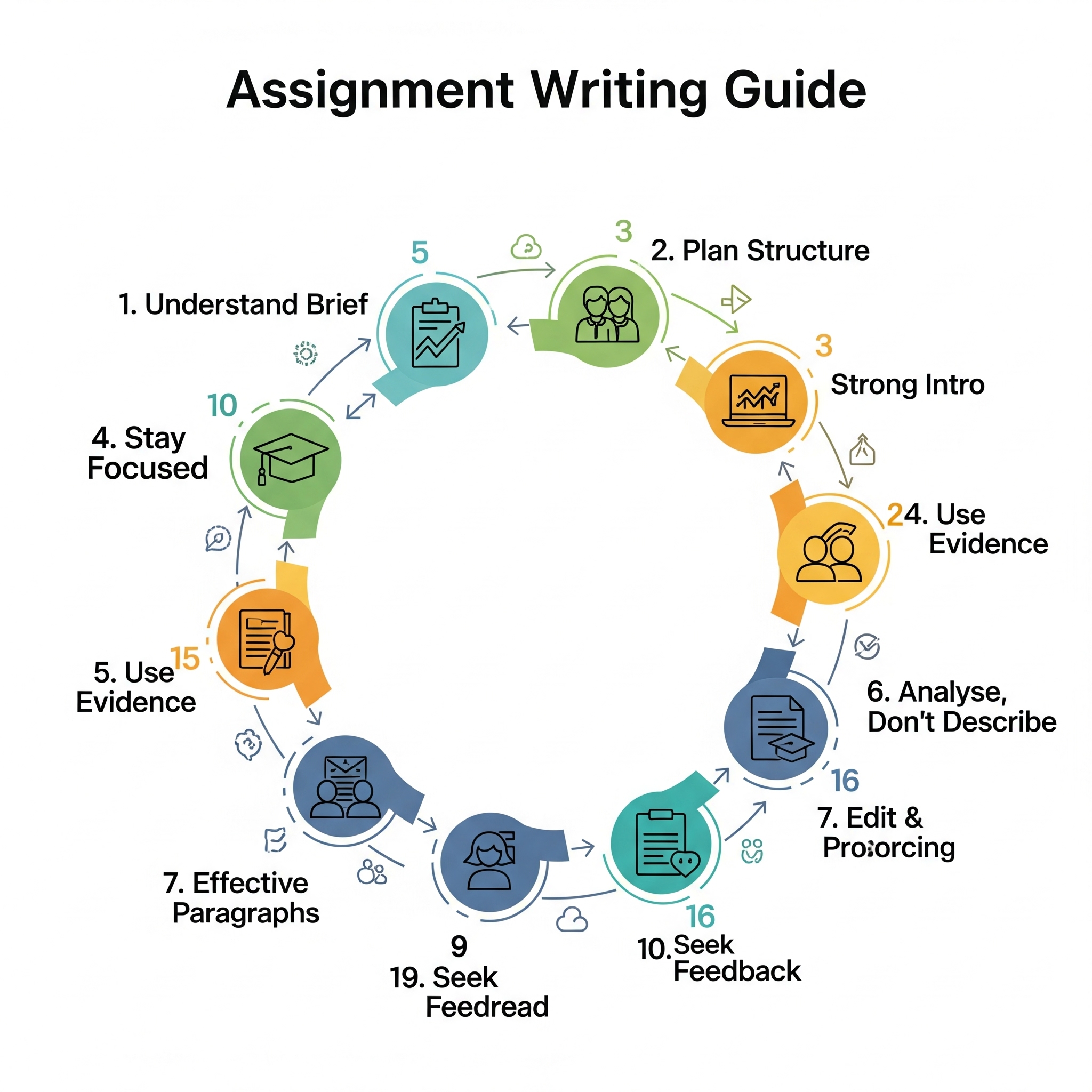College assignments come with many variables and details to remember. For both freshers and experienced learners, writing assignments are often a burden and a nuisance. However, it’s only a struggle as long as you don’t know what you’re doing.
In this article, you will learn how to ace all the assignments your professor can task you with. Simply nail the basics, and the rest will follow.
1. Understand the Assignment Brief
There are lots of different kinds of assignments students have to write. Learning to tell academic papers apart is the first step. Begin every writing project by thoroughly reading the brief. Assuming that an essay and a research paper follow the same assignment format can lead you to lose points.
Note the details
When reading the assignment prompt, make sure you note the following details since they can make or break your paper:
- Assignment type
- Main question
- Deadline
- Submission format (online or offline)
- Word count
- Formatting style
- Required sources
- Assessment criteria
If you need to clarify any instructions, it’s better to ask your professor rather than make assumptions.
2. Plan Your Assignment Structure
Once you’ve gotten acquainted with the essay writing assignment, you can start writing up a structure draft. For an essay, a basic outline looks like this:
- Introduction - strong hook, topic background and a thesis statement.
- Main body - approximately three body paragraphs with an argument for each.
- Conclusion - no new information, only results of your research.
Extend this outline by adding your ideas for each paragraph, potential sources and facts from preliminary research.
Create a timeline
With a detailed outline out of the way, the writing process gets much easier. Now you can create an assignment writing plan. Approximate the time you’ll need for each section. Sum it all up and add some more for editing and final tweaks. If possible, leave a day for the paper to ‘rest’ before you go in for the last round of edits.
3. Start with a Strong Introduction
A strong intro often features a hook. A quote, question, or interesting fact will captivate the reader and spike their interest. Background information on the topic should follow the hook; this will help the reader understand the context of your research. Lastly, a clear, specific thesis statement will signal the purpose of your paper.
Look outwards for inspiration
The introduction section will likely get the most attention, so it has to be written well. Many students address an assignment writing service with a do my assignment request to get an essay sample written by a professional. Collaborating with an experienced academic writer will help you see the writing process from start to finish and get a better grasp on the fundamentals of crafting a college paper.
4. Stay Focused and Stick to the Point
Distractions are a student’s worst enemy. The sooner you learn how to manage them, the faster you will deal with homework assignments. Remember to stick to your outline. Use it as a guide and let it shape your writing. Check back with each paragraph to ensure it’s relevant to your thesis.
Organize your space
A few minutes of preparation can go a long way.
- Tidy up your desk
- Close unnecessary tabs
- Turn off notifications
- Get a glass of water
This simple daily routine will give a signal to your brain that it’s time to work. After a few repetitions, your brain will associate cleanup with writing and you’ll have an easier time getting focused.
5. Use Evidence to Support Your Argument
An academic paper can only be considered credible if the facts are supported by literature. Your writing assignment instructions will likely include a number of sources you are required to use. Your professor may also want you to refer to a specific book covered in class. Make sure you pay attention and obtain all the necessary readings.
Carefully select sources
- Start the research with your reading list and syllabus
- Use the school library or the college database
- Rely on Google Scholar and platforms like JSTOR, ProQuest, or EBSCOhost for peer-reviewed journal articles
- Opt for more recent publications
- Stick to .gov or .edu domains; avoid blogs or Wikipedia
Researching for your paper can take a long time if you don’t know what you’re doing. These tips will definitely ease the process.
6. Analyze, Don’t Just Describe
One mistake freshmen often make in academic writing is failing to properly analyze information. Instead of presenting facts you’ve discovered during research, you have to explain to the reader what they mean and why this information is important.
Deepen your arguments
Ensure every little factoid or piece of evidence relates back to your thesis. This will ensure that you stay on topic while exploring the topic in detail and showcasing your research skills. Ask critical questions, point out assumptions or biases you discover in literature, compare different perspectives and highlight contradictions.
7. Structure Your Paragraphs Effectively
One of the key components in grading any college assignment is how well it’s organized. A messy text with no flow is unlikely to score an A. Always start writing with a clear topic sentence. Sort of like a thesis statement, it should guide the direction of each paragraph.
Ensure the text flows
- Connect your arguments to the main thesis
- Use transitional words and phrases
- Ensure one paragraph contains one argument, no more
8. Include Proper Referencing
Once you are done with the writing part, your essay needs to be formatted and polished. Written assignment instructions often mention the referencing style you are required to use. If not, don’t hesitate to ask your professor. Make sure you allocate enough time for referencing.
Study the formatting guides
APA, MLA, Harvard and other formatting guides are frequently updated, so pay close attention to the style itself and the edition you are required to use. Follow the guide carefully, note details like indentation, use of italics, capitalization, etc. Make sure every reference has a corresponding in-text citation and vice-versa.
9. Edit and Proofread Your Work
Editing is vital if you want your piece to reach its full potential. Ideally, you should put the essay away for a day before you get to editing. This will help you gain a fresh perspective on your own writing and spot more mistakes.
Use tools
Lots of online services offer free or affordable help to students in need. Grammarly is a great resource for eliminating grammar errors, spelling errors and unifying the writing style. At an assignment writing service like Studyfy, you can order a custom essay or even submit a proofreading order. AssignmentHelp.org is a student favorite when it comes to editing and rewriting.
10. Seek Feedback
With bigger tasks like theses, courseworks and dissertations, students usually stay in touch with professors during the entire process. While this practice is less common for essays, you are still allowed to ask your professor to help guide you. Alternatively, you can seek feedback from a family member, a fellow student or a friend.
Submit on time
This should go without saying, but you should always try to submit on time. If you see that you’re not going to make it, ask your professor for an extension. Alternatively, you can place an urgent order with AssignmentHelp and receive a custom-made paper in a day.
Wrapping Up
Writing skills and writing practices take time. There are no hard and fast rules to master sentence structure, thorough research, critical thinking, and gather information and communicate effectively.
Well written papers for proper credit will teach you many great skills, such as:
- active learning
- critical analysis
- constructive feedback
- first draft creation
- consulting reliable sources
To become a professional writer who can clearly discuss the main points is not just about good grades.
Following the good tips from our guide will result in the final product that's much more important - learning how to turn messy assignments into key points that resonate.


